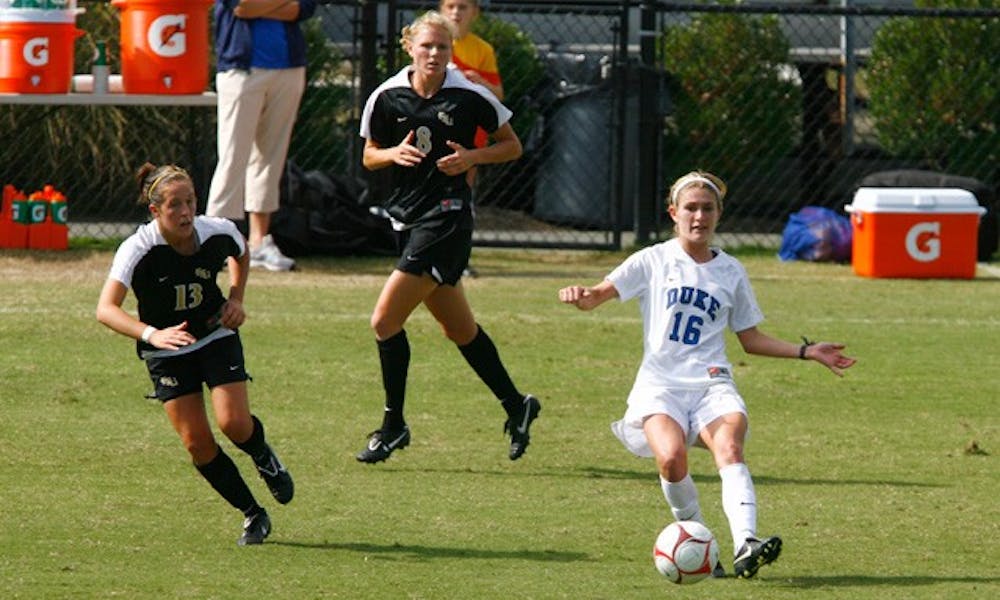When American defender Brandi Chastain blasted what would become an iconic penalty kick past Chinese goalkeeper Gao Hong to clinch the 1999 Women’s World Cup, Elisabeth Redmond was an 11-year-old girl dreaming of one day playing soccer on the big stage. Redmond never could have predicted that Chastain’s finish would give her just that opportunity, 11 years later.
Starting in March, Duke’s star midfielder will take to the professional pitch in preseason training camp with the Saint Louis Athletica, a founding member of the newly created Women’s Professional Soccer (WPS) league.
2010 marks the second year of the fledgling league, which has already overcome its fair share of adversity. Just last month, WPS’s showcase franchise, the Los Angeles Sol, folded after team owners declined to continue their investments in the club. Financial difficulties have become a calling card for professional women’s leagues, particularly for a sport like soccer that doesn’t currently have major drawing power in this country.
WPS, however, is not the first women’s soccer league to launch in the United States. Following the 1999 World Cup win, Americans’ interest in women’s soccer was at a high, and for the first time, investors were willing to oversee the development of a national professional league.
The Women’s United Soccer Association (WUSA) was born in 2000, with eight teams across the country featuring many of the best players in the world. Though the league had widespread initial support, multiple corporate sponsors and even a national television contract, high operating costs would soon doom the league. Even though many players, including Duke assistant coach and national team hero Carla Overbeck, agreed to substantial salary cuts, the writing was on the wall before the third and final season ever began.
“Leagues struggle, and they struggle early on especially,” Overbeck said. “It seemed every few months the league was asking investors for a few more million dollars, and after a while it was obvious that that wasn’t going to happen anymore.”
WUSA discontinued operations in the fall of 2003, and professional women’s soccer went on an indefinite hiatus. Though league officials attempted to line up new investors and resurrect the league the following year, it proved a hard sell, particularly since MLS, the men’s equivalent, had not yet proven that professional soccer could be successful in the United States.
MLS has since developed into a financially stable and growing league, and with Americans showing more affection toward the game, the skeleton organization left over from WUSA convinced new investors to revive the defunct women’s league. New organizers promised a less financially risky business model, with WPS League commissioner Tonya Antonucci seeking to avoid the failures of the WUSA by employing a “local, grass-roots approach.” She asked team investors to shoulder operating budgets of around $3 million per season, a far cry from the extravagance of the WUSA, whose team owners collectively lost an estimated $100 million over three years.
The first WPS season saw moderate success, and attendance for the playoff rounds averaged about 5,500 fans per game—close to the figures the WUSA managed. Despite the Sol folding, the future of the WPS looks bright, as no other league boasts as many national team stars. This season, the WPS welcomes two new franchises, the Philadelphia Independence and the Atlanta Beat, to bring the total number of teams in the league to eight.
In St. Louis, an energetic fan base is hoping the Athletica can make a run to the top of the standings this year, after a second-place regular season finish to the Sol in 2009. Redmond joins a side led by U.S. National Team goalkeeper Hope Solo and recent acquisitions such as defensive midfielder Shannon Boxx and striker Lindsey Tarpley.
“It’s going to be incredible [playing with those players],” Redmond said. “I’ve played with some of them before, and I have so much respect for them as players and people.”
Redmond’s journey begins in March with training camp, where she will compete for one of the Athletica’s 18 regular roster spots. If selected by manager Jorge Borcellos, who also coaches the Brazilian women’s national team, Redmond’s season would begin in April and span 24 regular season games leading into WPS’s championship tournament. Still, Redmond knows that the pitch could be a long way away.
“I feel like I have another job with training,” Redmond said. “I’ve been practicing every day, running, lifting…. I spend about four hours a day just preparing.”
As a WUSA veteran herself after a stint playing for the Carolina Courage, Overbeck knows Redmond possesses the talent to play professionally and is confident that the Blue Devil can successfully transition to the high-speed, high-skill professional game.
“From the second she stepped onto the soccer field at Duke, you could tell she was on a different level,” Overbeck said. “I know how hard she’s worked, and she’s absolutely got all it takes to play with the professionals.”
Get The Chronicle straight to your inbox
Sign up for our weekly newsletter. Cancel at any time.

